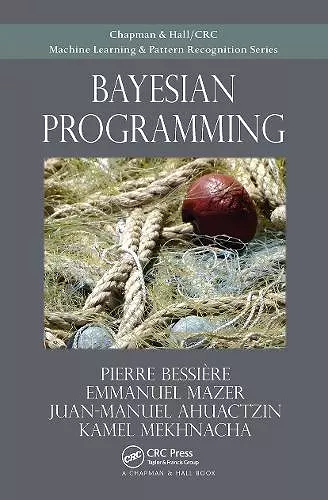Bayesian Programming
Pierre Bessiere author Emmanuel Mazer author Juan Ahuactzin author Kamel Mekhnacha author
Format:Paperback
Publisher:Taylor & Francis Ltd
Published:21st Jan '23
Currently unavailable, and unfortunately no date known when it will be back
This paperback is available in another edition too:
- Hardback£145.00(9781439880326)

Probability as an Alternative to Boolean LogicWhile logic is the mathematical foundation of rational reasoning and the fundamental principle of computing, it is restricted to problems where information is both complete and certain. However, many real-world problems, from financial investments to email filtering, are incomplete or uncertain in nature. Probability theory and Bayesian computing together provide an alternative framework to deal with incomplete and uncertain data.
Decision-Making Tools and Methods for Incomplete and Uncertain DataEmphasizing probability as an alternative to Boolean logic, Bayesian Programming covers new methods to build probabilistic programs for real-world applications. Written by the team who designed and implemented an efficient probabilistic inference engine to interpret Bayesian programs, the book offers many Python examples that are also available on a supplementary website together with an interpreter that allows readers to experiment with this new approach to programming.
Principles and Modeling Only requiring a basic foundation in mathematics, the first two parts of the book present a new methodology for building subjective probabilistic models. The authors introduce the principles of Bayesian programming and discuss good practices for probabilistic modeling. Numerous simple examples highlight the application of Bayesian modeling in different fields.
Formalism and AlgorithmsThe third part synthesizes existing work on Bayesian inference algorithms since an efficient Bayesian inference engine is needed to automate the probabilistic calculus in Bayesian programs. Many bibliographic references are included for readers who would like more details on the formalism of Bayesian programming, the main probabilistic models, general purpose algorithms for Bayesian inference, and learning problems.
FAQsAlong with a glossary, the fourth part contains answers to frequently asked questions. The authors compare Bayesian programming and possibility theories, discuss the computational complexity of Bayesian inference, cover the irreducibility of incompleteness, and address the subjectivist versus objectivist epistemology of probability.
The First Steps toward a Bayesian ComputerA new modeling methodology, new inference algorithms, new programming languages, and new hardware are all needed to create a complete Bayesian computing framework. Focusing on the methodology and algorithms, this book describes the first steps toward reaching that goal. It encourages readers to explore emerging areas, such as bio-inspired computing, and develop new programming languages and hardware architectures.
"Bayesian Programming comprises a methodology, a programming language, and a set of tools for developing and applying … complex models. … The approach is described in great detail, with many worked examples backed up by an online code repository. Unlike other books that tend to focus almost entirely on mathematics, this one gives equal time to conceptual and methodological guidance for the model-builder. It grapples with the knotty problems that arise in practice, some of which do not yet have clear solutions."
—From the Foreword by Stuart Russell, University of California, Berkeley
"The book has many worked examples backed up by an online code repository. The book provides a contibution on conceptual and methodological guidelines for model-builders. The authors discuss the problem how to build a Bayesian computer. The book has an excellent bibliography."
—Nirode C. Mohanty, in Zentralblatt MATH 1281
ISBN: 9781032477404
Dimensions: unknown
Weight: 580g
384 pages